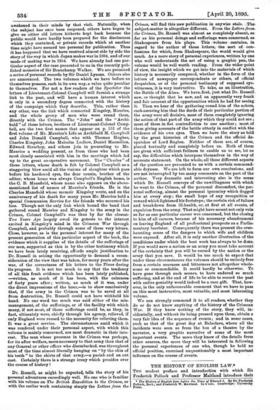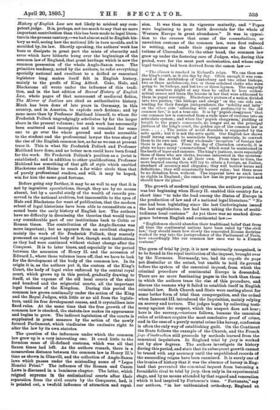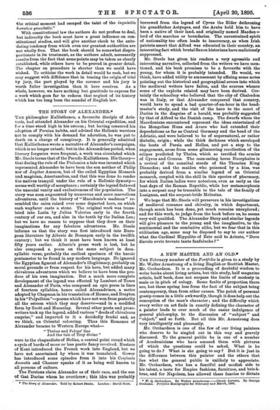THE HISTORY OF ENGLISH LAW.*
THE modest preface and introduction with which Sic Frederick Pollock and Professor Maitland introduce their * The History of Fred Lam before the Tit11,6 of Edward I. By Sir Frederick
Pollock, Bart., and erick W. Maitland. In 2 vols. Cambridge : lJniversity Press.
History of English Law are not likely to mislead any com- petent judge. It is, perhaps, not too much to say that no more important contribution than this has been made to legal litera- ture in the present century,—we had almost said to English his- tory as well, seeing how the national life in turn moulds, and is moulded by, its law. Shortly speaking, the authors' work has been to dissipate in great part the mists of obscurity and error which have hitherto hung over the beginnings of the common law of England, that great heritage which is now the common possession of the whole Anglo-Saxon race. The primitive tendency, noted by the authors, to refer everything specially national and excellent to a deified or canonised legislator long makes itself felt in English history, mainly to the profit of King Alfred. Coke, Hale, and Blackstone all wrote under the influence of this tradi- tion, and in the last edition of Reeves' History of English Law, whole pages of that monument of medimval fiction, The Mirror of Justices are cited as authoritative history. Much has been done of late years in Germany, in this country, and in America, to explode such fictions ; and by none more than by Professor Maitland himself, to whom Sir Frederick Pollock ungrudgingly attributes by far the larger share in the present volumes ; but such work has necessarily been scattered and incomplete and it remained for some one to go over the whole ground and make accessible to the student and the professional lawyer the true story of the rise of the English common law, as far as we can at present trace it. This is what Sir Frederick Pollock and Professor Maitland have done, and no better men could have been found for the work. Sir Frederick Pollock's position as a jurist is established; and in addition to other qualifications, Professor Maitland has something of that gift of style which enabled Blackstone and Maine to reach a far wider circle than that of purely professional readers, and will, it may be hoped, win for him the same good fortune.
Before going any further, it may be as well to say that it is not by ingenious speculations, though they are by no means absent, but by a careful study of the wealth of records pre- served in the national archives, but inaccessible to the eyes of Hale and Blackstone for want of publication, that the modern school of legal historians have been able to reconstitute on a sound basis the early history of English law. The authors have no difficulty in dismissing the theories that would trace any considerable part of our institutions back to Celtic or Roman times. The contribution of the Anglo-Saxons was more important ; but as appears from an excellent chapter, mainly the work of Sir Frederick Pollock, they scarcely possessed an organised body of law, though such institutions as they had were continued without violent change after the Conquest. It is to later times, and especially to the period between the accession of Henry II. and the accession of Edward L, where these volumes leave off, that we have to look for the development of the body of the common law. In its origin it is, as the authors put it, the custom of the King's Court, the body of legal rules enforced by the central royal court, which grows up in this period, gradually drawing to itself, at the expense of the old local courts of the shire and hundred and the seignorial courts, all the important legal business of the Kingdom. During this period the common law grows continually under the action of the King and the Royal Judges, with little or no aid from the legisla- ture, until its free development ceases, and it crystallises into fixed rules. At the same time that the free growth of the common law is checked, the statute-law makes its appearance and begins to grow. The indirect legislation of the courts is supplanted in great measure by the action of the newly formed Parliament, which vindicates the exclusive right to alter the law by its own statutes.
The question of the influences under which the common law grew up is a very interesting one. It owed little to the formless mass of ill-defined customs, which was all that Saxon times had left. As the authors remark, there is a measureless distance between the common law in Henry LL's time as shown in Glanvill, and the collection of Anglo-Saxon laws which passes under the misleading name of " Leges Henrici Primi." The influence of the Roman and Canon Laws is discussed in a luminous chapter. The latter, which reigned supreme in the ecclesiastical courts after their separation from the civil courts by the Conqueror, had, it is pointed out, a twofold influence of attraction and repul-
sion. It was then in its vigorous maturity, and " Popes were beginning to pour forth decretals for the whole of Western Europe in great abundance." It was in opposi- tion to the canones that some of the consuetudin,es, or unwritten customs of the common law, were first reduced to writing, and made their appearance as the Consti- tutions of Clarendon. Oa the other hand, the common law grew up under the fostering care of Judges, who, during this period, were for the most part ecclesiastics, and whose only legal training had been derived from the canon law :—
" The climax is reached in Richard's reign. We can then see the king's court, as it sits day by day. Often enough it was com- posed of the Archbishop of Canterbury and two other bishops, two or three archdeacons, two or three ordained clerks who were going to be bishops, and but two or three laymen. The majority of its members might at any time be called to hear ecclesi- astical causes and learn the lessons in law that were addressed to them in papal rescripts. Blackstone's picture of a nation divided into two parties, ' the bishops and clergy' on the one side con- tending for their foreign jurisprudence, the 'nobility and laity' on the other side adhering with equal pertinacity to the old common law,' is not a true one. It is by 'popish clergymen' that our common law is converted from a rude mass of customs into an articulate system ; and when the popish clergymen,' yielding at length to the pope's commands, no longer sat as the principal justices of the king's court, the golden age of the common law is over The assize of novel desseisin is suggested by the actio spolii; but it is not the actio spolii. Our English law shows itself strong enough to assimilate foreign materials, to convert them to its own use. Of any wholesale reception' of foreign law there is no danger. From the day of Clarendon onwards, it is plain we have many consuetudinea ' which must be maintained in the teeth of leges and canones. The king's justices, more especially those of them who are clerks, become interested in the mainten- ance of a system that is all their own. From time to time, the more learned among them will try to attain a foreign, an Italian, standard of accuracy and elegance; they will borrow terms and definitions ; they will occasionally borrow rules ; but there must be no dictation from without. The imperial laws as such have no rights in England ; the canon law has its proper province and should know its place."
The growth of modern legal systems, the authors point out, was but beginning when Henry II. enabled this country for a short time "to take the lead among the States of Europe in the production of law and of a national legal literature." "No one had been legislating since the last Carlovingians issued the last capitularies; law had been taking the form of multi- tudinous local customs." As yet there was no marked diver- gence between English and continental law :—
"Englishmen should abandon their traditional belief that from all time the continental nations have been ruled by 'the civil law,' they should learn how slowly the renovated Roman doctrine worked its way into the jurisprudence of the Parliament of Paris, how exceedingly like our common law once was to a French coutunte."
The germ of trial by jury, it is now universally recognised, is to be found in the royal institution of the inquest, brought over by the Normans. Normandy, too, had its enquite du pays not dissimilar at the outset, but unable to hold its ground before the system of the canonical inquest, from which the criminal procedure of continental Europe is descended.
There are no more fascinating pages in the book than those in which the authors trace the rise of this procedure, and discuss the reasons why it failed to establish itself in English criminal law. Both Church and State were casting about for some better form of trial than compurgation, and the ordeal when Innocent III. introduced the Inquisition, mainly relying on secrecy and torture. The judges begin by collecting testi- mony against the suspect, which the suspect does not hear; here is the secrecy,—torture follows, because the canonical rules of evidence require the most conclusive proof of crime, and in the case of a purely mental crime like heresy, confession
is often the only way of establishing guilt. On the Continent the State follows the example of the Church, and the French juge d'instruction still proceeds by methods learned from the canonical inquisitors. In England trial by jury is worked out by slow degrees. The authors investigate its history during this period, and state that its subsequent geowth cannot be traced with any accuracy until the unpublished records of the succeeding reigns have been examined. It is surely one of the ironies of history that it was the absence of heresy in Eng. land that prevented the cononical inquest from becoming a formidable rival to trial by jury, then only in its experimental stage, and by no means attended by that regard and veneration which it had inspired by Fortescue's time. " Fortunate," say our authors, " in her unblemished orthodoxy, England at
the critical moment had escaped the taint of the inguisitio haveticx pravitatis." With constitutional law the authors do not profess to deal, but indirectly the book must have a great influence on con- stitutional studies, and will give another check to the ante- -dating tendency from which even our greatest authorities are not wholly free. That the book should be somewhat dispro- portionate in its treatment, as the authors admit, necessarily tresults from the fact that some points may be taken as clearly established, while others have to be proved in greater detail. The chapter on procedure is shorter than we could have wished. To criticise the work in detail would be rash, but we may suggest with diffidence that in tracing the origin of trial by jury, the part played by the coroner and his jury is worth fuller investigation than it here receives. As a whole, however, we have nothing but gratitude to express for a work which goes far to redeem that neglect of its history which has too long been the scandal of English law.




































 Previous page
Previous page